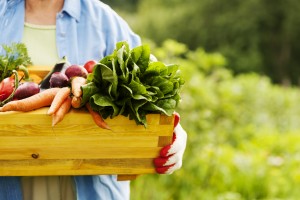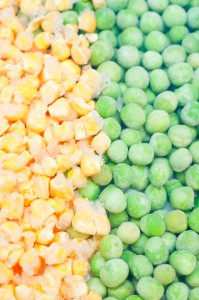Fresh vs Frozen Veggies: Which Is Right For You?
Over 85 percent of Americans aren’t eating enough vegetables, according to a recent report published by the Centers for Disease Control (CDC). There are many factors that lead to our country’s lack of veggie consumption, but maybe one major reason is the simple fact that people don’t know how to find the right produce for them.
There is an age old debate when it comes to vegetables and that is: fresh or frozen? Which is the right way to go? In the interest making your life easier, I’m pretending that canned vegetables aren’t an option. Today it’s all about fresh vs. frozen.
Both fresh and frozen vegetables can pros and cons, but I’m going to give you the tools and info you need to make the most beneficial decision for yourself. Everyone’s situation is different, so to say one option is absolutely superior to the other is completely unfair.
The one common denominator is that, as a whole, Americans need to be eating more vegetables and this will give you the tools to do so.
Fresh Vegetables
There are definitely plenty of pros when it comes to choosing fresh vegetables over frozen.  For starters, I think we can all agree that an in-season, locally-grown, organic vegetable is the undisputed champion of this argument. Unfortunately, most people don’t have access to that. If you do, consider yourself lucky.
For starters, I think we can all agree that an in-season, locally-grown, organic vegetable is the undisputed champion of this argument. Unfortunately, most people don’t have access to that. If you do, consider yourself lucky.
Another thing that fresh veggies have going in their favor is the enhanced flavor and flexibility of cooking methods. I believe that a fresh vegetable is going to be a little bit tastier than anything that’s been frozen, as well as more versatile in how you can prepare that vegetable.
Winning the taste test is great, but fresh vegetables do have a downside, believe it or not. One major disadvantage is that fresh produce is always more expensive than frozen. This is especially true if you’re buying Organic vegetables. If you can afford to do this consistently, that’s a huge plus, but many folks do not have that luxury so prices are very crucial.
BEST. Breakfast. Ever. (recipe inside)
The major knock on fresh vegetables is that they may not even be superior nutritionally when compared to their frozen counterpart. Many of the vegetables available at the grocery store are picked prior to peak ripeness, sprayed with pest-controlling chemicals and then shipped across the country on a truck to your local supermarket. By the time we get our hands on these veggies, it may have been up to 7 days after they were picked – which means the nutritional density has dropped by as much as 75 percent.
I’d say the pros and cons are about equal when it comes to analyzing fresh veggies. Now let’s look at frozen and see what the comparison is.
Frozen Vegetables
Similar to fresh produce, the frozen option has both positive and negative conclusions associated with it.  The first major benefit of frozen vegetables is that they are picked at the perfect time. After they are harvested, they are blanched in hot water and flash frozen to retain maximal freshness. The frozen vegetable that you later eat will be as fresh as the day it was picked.
The first major benefit of frozen vegetables is that they are picked at the perfect time. After they are harvested, they are blanched in hot water and flash frozen to retain maximal freshness. The frozen vegetable that you later eat will be as fresh as the day it was picked.
The downside of that process is that in the blanching process Vitamin B & C degradation is common because they are water soluble vitamins. Other than that, some studies suggest that frozen vegetables actually retain more nutrients and antioxidants than the fresh selection we see at the supermarket. This study even referred to the frozen foods in the experiment as, “clearly superior to all market produce.”
In addition to their greater nutritional profile, frozen vegetables are way more affordable than buying fresh. I’ve seen organic frozen produce for as little as 20-cents per serving. If your budget is tight, hitting up the freezer aisle may not be a bad idea.
As mentioned before, the flexibility of how you can prepare a fresh vegetable is definitely more extensive, but the convenience factor of eating pre-cut frozen veggies is another thing to consider. In terms of cooking time and accessibility, frozen veggies make a stronger case.
The only red flag I see in the frozen category is the potential use of food additives and chemicals, so make sure to read the labels. You want to make sure that the vegetables are you buy are strictly frozen, not preserved chemically as well. It’s not terribly common, but something you should look out for.
How to Choose
Right now you may be torn on which route you want to go. I’ve tried to be unbiased and present the real pros and cons of each option. There are 3 things to consider when you make the choice:
- Budget
If you’re on a tight budget, you may want to stick to strictly frozen vegetables. You’re guaranteed to save cash and won’t have to sacrifice nutritional benefits. If money isn’t an obstacle for you, and you don’t mind spending extra, then you may want to consider what season it is.
- Season
If it’s the heart of winter and you’re buying fresh Green Beans, there’s no telling how they’ve been preserved or how long it’s been since they were harvested. Typically a spring/summer vegetable, Green Beans are a prime example of a product that may be better when frozen. In fact, this study suggests that Green Beans, Carrots, Zucchini, Tomatoes and Peas are all equally (or more) beneficial when frozen.
Here’s a list of the 5 most popular vegetables for each harvesting season:
Spring: Asparagus, Mushrooms, Peas, Spinach, Celery
Summer: Corn, Carrots, Tomatoes, Green Beans, Eggplant
Fall: Broccoli/Cauliflower, Brussels sprouts, Greens (all kinds), Pumpkins, Cabbage
Winter: Yams/Potatoes, Squash, Turnips, Parsnips, Onions
- Location
Location is key in the process as well. If your budget isn’t an issue and you’re looking for an in-season vegetable, you should find out if that food is being locally grown near you. If so, that may be your ticket to the perfect produce. Remember, you can’t really beat a locally-grown, in-season vegetable.
Final Words
With all of these things in consideration, you can make the best decision for yourself. There is no wrong way to eat your veggies (as long as you don’t fry them!). Just eat them. Remember, over 85% of Americans aren’t eating them enough.
If you lack green in your diet and often attribute it to, “I can’t afford fresh produce,” or “There’s never good-looking product at my grocery store,” now there should be nothing holding you back from finding vegetables that work for you.
***Click here for FREE under 10 minute workouts!
What do I suggest? Personally, I live in the Midwest where the winters are harsh and the health food culture isn’t exactly booming. In my case, I opt for mostly frozen vegetables. During the warm months, I usually go to a Farmer’s Market for veggies and get whatever is in-season fresh – then get the rest of my stuff frozen from the grocery store.
I would say frozen is generally the better option for the majority of people. Most people don’t have access to a farm fresh selection of produce. I believe buying frozen is going to be financially helpful, give you more convenience when you prepare them and, of course, benefit you nutritionally in a major way.
The USDA only suggests 2 ½ cups of vegetables per day, but my personal recommendation is to aim for 4+ cups per day. Lightly steaming your veggies is the way to go, try to minimize the temperatures your produce is exposed to.
Follow these guidelines and you’ll be able to optimize your diet with the addition of vegetables that benefit you the most.
Written by Justin Ochoa
About the Author: Justin Ochoa is a Personal Trainer and Gym Manager at 1 & Only Fitness (Fishers, IN) with a client roster ranging from athletes to rehabilitation patients. Justin is also a freelance writer, covering health, fitness, nutrition and lifestyle optimization for sites such as stack.com and askmen.com. You can find Justin on Facebook, follow him on Twitter and Instagram or email him here!